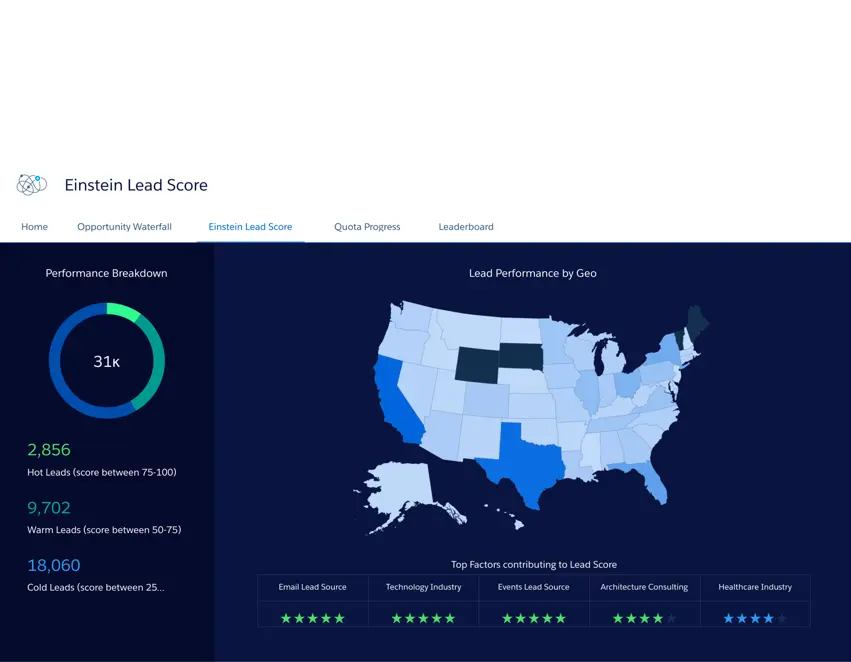In September 2016, Salesforce revealed Einstein, the suite of AI in sales technologies now baked into its core CRM platform. Einstein offers a range of insights, predictions, recommendations and automation features across all Salesforce products. The company’s goal? According to the Einstein FAQ, to help you "become an AI-first company so you can get smarter and more predictive about your customers."
In other words, a $50+ billion sales and marketing behemoth just went all-in on artificial intelligence. The implications—even for those who don’t use Salesforce—are significant. We took a closer look at Einstein and how it impacts marketers and salespeople. (Hint: Your operations are about to get a lot smarter, a lot faster than you think.)
What Is Salesforce Einstein?
Salesforce Einstein is a suite of AI technologies that Salesforce developed in-house or acquired through nine AI acquisitions made in the years leading up to Einstein’s release. These technologies will be built into all core Salesforce offerings, providing benefits for each of the company’s marketing, sales and service platforms (called “clouds”).
What Does Salesforce Einstein Do?
Einstein’s AI and machine learning capabilities span four major areas:
- Discovery — Learn more about prospects and customers.
- Prediction — Anticipate the outcomes of marketing, sales or service actions.
- Recommendation — Recommend best actions for a particular contact in a particular context or scenario.
- Automation — Reduce the manual labor required to achieve marketing, sales or service goals.
Discovery, prediction, recommendation and automation work in a number of ways across the company’s eight different clouds:
- Marketing — Predict audiences and optimize communication send times.
- Sales — Develop predictive lead scoring and learn more about sales opportunities.
- Service — Recommend case classifications and responses, as well as predict close time.
- Analytics — Automate analytics functions and the stories told with that data.
- Apps — Use predictive modeling and sentiment services.
- Commerce — Recommend products and provide commerce insights.
- Internet of Things — Implement predictive device scoring and recommend best next actions.
- Community — Automate service escalation and recommend experts, articles and topics.
Take a look at the Salesforce Einstein page and FAQ to learn more about the product. Even if you’re not a Salesforce customer, it’s worth understanding Einstein better: the solution has significant implications for marketers and salespeople in any industry.
Why Does This Matter?
Einstein matters for two reasons: market validation and the democratization of AI.
is market validation. Salesforce is the latest tech giant to invest heavily in artificial intelligence. IBM, Google and Facebook have made major investments in AI. Q2 2016 investment alone in AI companies totaled $1.049 billion, according to CB Insights. Follow the money and it’s clear why Salesforce is all-in.
This means even if you don’t use Salesforce, other tools you do use may compete with Salesforce. If they do, bet on AI becoming a lot more important to their long-term growth strategies, if it isn’t already. The market validation is there, and when it comes to AI and machine learning, first movers reap major benefits.
As noted by The Master Algorithm, a book included in our post on AI resources for marketers:
“In the same way that a bank without databases can’t compete with a bank that has them, a company without machine learning can’t keep up with one that uses it. While the first company’s experts write a thousand rules to predict what its customers want, the second company’s algorithms learn billions of rules, a whole set of them for each individual customer. It’s about as fair as spears against machine guns. Machine learning is a cool new technology, but that’s not why businesses embrace it. They embrace it because they have no choice.”
Second, Salesforce aims to compound its first mover advantage by democratizing the technology, or creating “AI for everyone.” 100,000 Salesforce customers just woke up to AI and machine learning as a part of their daily work. They span a multitude of companies in diverse industries. Those industries must now all sell in an environment where some players have AI and some don’t. The advantages of those who do will, in time, become clear.
For at least 100,000 companies, artificial intelligence is here to stay in a big way. We predict many more will follow.
For more news, analysis and interviews on artificial intelligence in marketing, subscribe to the Marketing Artificial Intelligence Institute.
Mike Kaput
Mike Kaput is the Chief Content Officer at SmarterX and a leading voice on the application of AI in business. He is the co-author of Marketing Artificial Intelligence and co-host of The Artificial Intelligence Show podcast.


